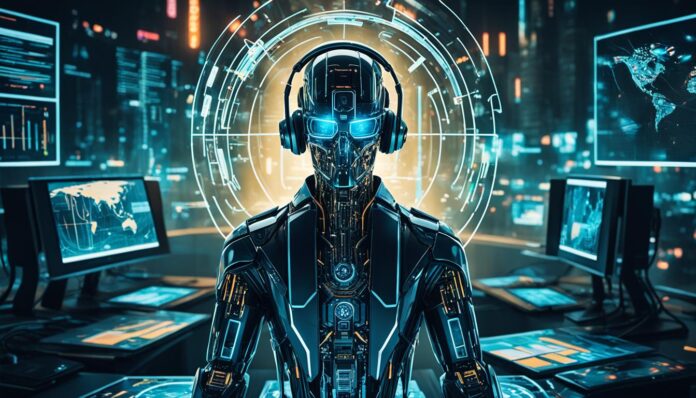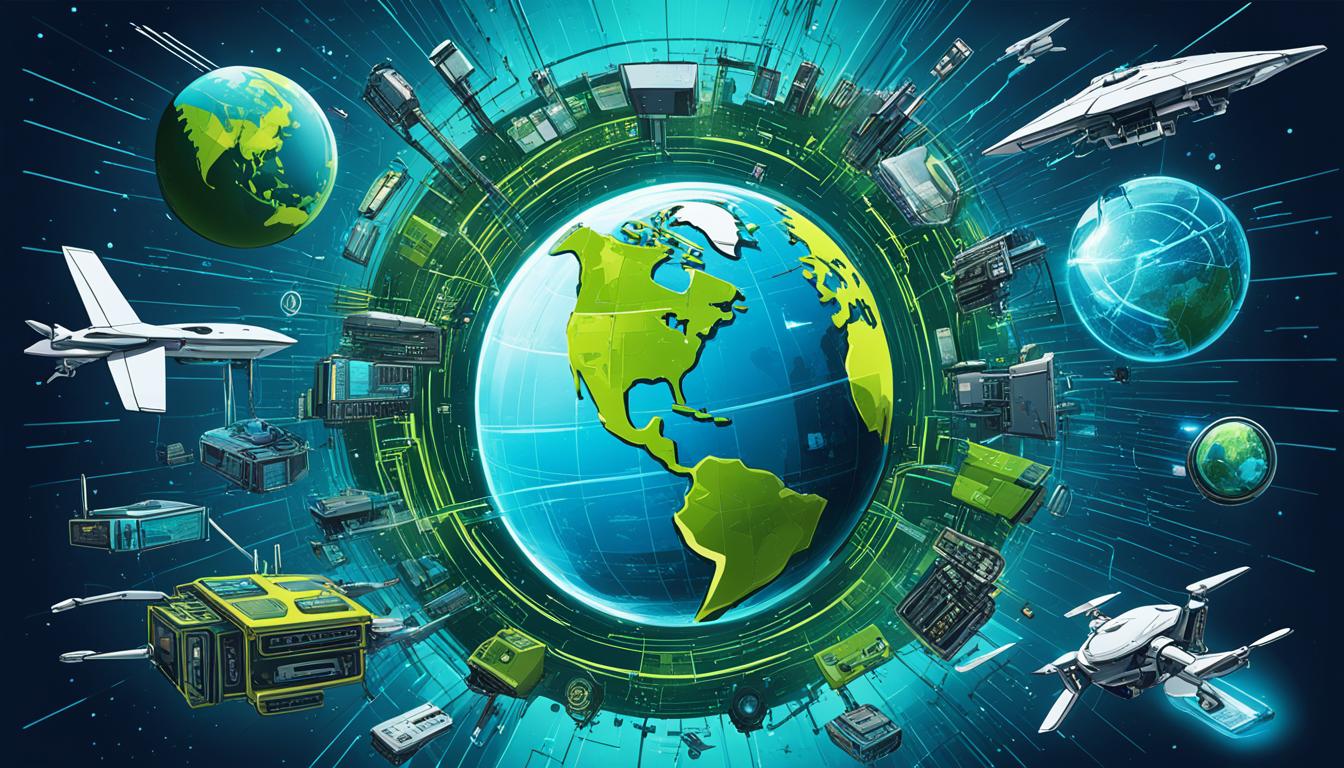
As the world continues to evolve at a rapid pace, the implications of 2025’s technology trends on global politics are both exciting and concerning. According to experts from the Pew Research Center and Elon University’s Imagining the Internet Center, the future holds a mixed bag of potential outcomes. While some foresee a “tele-everything” world where remote work, telemedicine, and virtual interactions become the norm, others worry about the rise of greater inequality, authoritarianism, and the spread of misinformation.
The COVID-19 pandemic has accelerated the adoption of these “remote” processes, leading to more people working from home, engaging in virtual social and entertainment activities, and making fewer public forays. This reliance on digital tools, driven by a yearning for convenience and safety, has the potential to enhance the power of big technology firms and erode the privacy and autonomy of users. However, some experts also express hope that these changes could lead to reforms aimed at racial justice, social equity, and technology enhancements that improve the quality of life for families and workers.
From the rise of artificial intelligence (AI) and the Internet of Things (IoT) to advancements in quantum computing, biotechnology, and space exploration, the technological landscape of 2025 is poised to reshape global power dynamics. These emerging technologies hold both promise and peril, as they could lead to critical superiority and projection of power in defense, security, and intelligence, while also posing risks of losing control and causing major international relations and security dilemmas.
Key Takeaways
- The COVID-19 pandemic has accelerated the adoption of remote work, telemedicine, and virtual interactions, leading to a “tele-everything” world.
- Reliance on digital tools has the potential to enhance the power of big tech firms and erode user privacy and autonomy.
- Emerging technologies like artificial intelligence, quantum computing, and biotechnology hold both promise and peril for global politics.
- Experts are concerned about the rise of greater inequality, authoritarianism, and the spread of misinformation due to technology trends.
- Some experts see potential for positive change, including reforms aimed at racial justice, social equity, and improved quality of life.
The Rise of Tele-Everything and Its Impact on Global Politics
The COVID-19 pandemic has accelerated the adoption of “remote” processes, leading to a surge in tele-everything – more people working from home, increased virtual interactions, and fewer public outings than in recent years. This shift towards a remote work and digital tools driven society is fueled by our yearning for convenience and safety, but it also poses significant challenges for cybersecurity and data privacy.
Acceleration of Remote Work and Virtual Interactions
The Pew Research Center and Elon University’s Imagining the Internet Center’s canvassing of experts found that the COVID-19 pandemic has accelerated the adoption of “remote” processes like telework, telemedicine, virtual schooling, and e-commerce. In 2025, there will be more people working from home and engaging in virtual social and entertainment interactions, with fewer public outings than in recent years.
Increased Reliance on Digital Tools for Convenience and Safety
Humans’ yearning for convenience and safety has fueled a reliance on digital tools. The expert respondents foresee significant changes that could enhance the power of big technology firms as they exploit their market advantages and mechanisms such as artificial intelligence (AI) in ways that seem likely to further erode the privacy and autonomy of their users.
Challenges of Cybersecurity and Data Privacy
The Pew Research Center and Elon University’s Imagining the Internet Center’s canvassing of experts found that the COVID-19 pandemic has accelerated the adoption of “remote” processes. The expert respondents foresee significant changes that could enhance the power of big technology firms as they exploit their market advantages and mechanisms such as artificial intelligence (AI) in ways that seem likely to further erode the privacy and autonomy of their users, posing challenges for cybersecurity and data privacy.
Emerging Technologies Reshaping the Global Power Dynamics
As the world rushes towards the year 2025, the advancements in artificial intelligence, autonomous systems, quantum computing, and biotechnology are poised to have a profound impact on global politics and international relations. These emerging technologies are rapidly reshaping the global power dynamics, presenting both opportunities and challenges for nations, leaders, and policymakers alike.
Artificial Intelligence and Autonomous Systems in Defense and Security
According to experts, the most transformative potential for international relations and security (IR&S) is offered by artificial intelligence (AI) and, to a lesser extent, the Internet of Things (IoT). The expert responses indicate that smart and interconnected systems may confer critical superiority and projection of power in the realms of defense, security, and intelligence gathering. However, the growing reliance on AI/IoT also raises concerns about losing control over, or experiencing an increasing number of faults in, important IR&S processes, potentially leading to major diplomatic tensions or even military conflicts.
Quantum Computing and Its Potential for Cyber Warfare
Contrary to the most debated threats like devastating cyber-terror, a cyber-Cold War, or a cyber-Hobbesian realm, the Second source suggests that these may be highly unlikely from a system perspective. This is because at least much of the new cyber arsenals (excluding cyber espionage and, to a much lesser extent, cyber-sabotage) amid defensive high-tech solutions may be offset by the growing interdependence of economies. Smart infrastructures, e-government, and the digitalization of other processes and objects may create, if not seamless, then still globalizing cyber spaces, which, together with further development of global value chains, makes any major conflict irrational. The development of cyber weapons may paradoxically play a role in a new cyber-deterrence, codes of conduct, and other rational behaviors.
Biotechnology Advancements and Their Implications
The Second source notes that among the most well-known emerging technologies with potentially transformative effects for the economy, politics, culture, and international relations and security (IR&S) are several umbrella high-tech domains, including biotechnology and genetic engineering. The expert responses suggest that these advancements in biotechnology could have significant implications for global power dynamics and IR&S, though the impact is still mostly speculative at this stage of development.

What are the implications of 2025’s technology trends for global politics?
The Role of Social Media and Public Engagement in Global Affairs
The Second source highlights an important technology-driven trend in international relations and security – rising public exposure and national/international community engagement in IR&S processes by the means of social networks, mobile internet solutions, and other digital tools. This process is a further realization of trends set by electronic media decades ago, but the demographic change, with the 3rd generation of Internet users and the 1st “smartphone generation,” plays a growing role. This may lead to a rise of direct democracy in global affairs, where personal engagement of citizens is enhanced by convenient and familiar Internet means.
Threats of Misinformation and Opinion Manipulation
However, the expert responses also identify concerns over opinion manipulations using Big Data and artificial intelligence, as evidenced by cases like the alleged Russian interference in the 2016 U.S. elections. The Pew Research Center and Elon University’s Imagining the Internet Center’s canvassing of experts found that many respondents expressed deep worry over the seemingly unstoppable manipulation of public perception, emotion, and action via online disinformation – lies and hate speech deliberately weaponized in order to propagate destructive biases and fears. They are concerned about significant damage to social stability and cohesion, as well as the reduced likelihood of rational deliberation and evidence-based policymaking.
Potential for Increased Transparency and Accountability
While the Pew Research Center and Elon University’s Imagining the Internet Center’s canvassing identified concerns over the threats of misinformation and opinion manipulation, the experts also noted the potential for increased transparency and accountability through the use of social media and other digital tools for public engagement in global affairs. The rise of direct democracy in international relations and security, enabled by convenient digital platforms, could lead to more citizen involvement and scrutiny of government actions, potentially enhancing transparency and accountability in global politics.
Conclusion
The insights from the Pew Research Center and Elon University’s Imagining the Internet Center offer a nuanced perspective on the implications of 2025’s technology trends for global politics. While the rapid adoption of “tele-everything” and the emergence of transformative technologies like artificial intelligence, quantum computing, and biotechnology present both opportunities and challenges, the experts also raise significant concerns over the threats of misinformation, opinion manipulation, and the potential erosion of privacy and autonomy.
On one hand, the experts foresee the power of big tech firms growing as they leverage their market advantages and AI-driven mechanisms, which could further diminish individual privacy and autonomy. On the other hand, they also recognize the potential for increased public engagement and transparency in global affairs through the use of social media and other digital tools, empowering citizens to participate more directly in international relations and security processes.
Ultimately, the impact of these technology trends will depend on how policymakers, institutions, and the public navigate this complex landscape. By harnessing the benefits while mitigating the risks, there is an opportunity to shape a future where technology enhances global cooperation, security, and democratic values. However, this will require vigilance, thoughtful governance, and a commitment to prioritizing the well-being of citizens over the interests of any single entity or ideology.
FAQ
What are the implications of 2025’s technology trends for global politics?
According to the Pew Research Center and Elon University’s Imagining the Internet Center, the COVID-19 pandemic has accelerated the adoption of “remote” processes like telework, telemedicine, virtual schooling, and e-commerce, leading to more people working from home, more virtual social and entertainment interactions, and fewer forays in public than in recent years. Humans’ yearning for convenience and safety has fueled a reliance on digital tools, and the expert respondents foresee significant changes that could enhance the power of big technology firms as they exploit their market advantages and mechanisms such as artificial intelligence (AI) in ways that seem likely to further erode the privacy and autonomy of their users, posing challenges for cybersecurity and data privacy.
How are emerging technologies reshaping the global power dynamics?
The expert responses indicate that smart and interconnected systems driven by technologies like artificial intelligence (AI) and the Internet of Things (IoT) may cause critical superiority and projection of power in the defense, security, and intelligence areas. There is also an open question whether newcomers, using some “killer” – most disruptive – technologies, may reverse the existing balance of power. However, the growing reliance on AI/IoT may also cause problems of losing control over and/or growing number of faults in important, even critical international relations and security processes, leading to major dilemmas, including diplomatic tensions or even military conflicts.
What are the potential impacts of biotechnology advancements on global politics?
The expert responses suggest that advancements in biotechnology could have significant implications for global power dynamics and international relations and security, though the impact is still mostly speculative at this stage of development.
How will social media and public engagement influence global affairs?
The expert responses identify concerns over opinion manipulations using Big Data and AI, as evidenced by cases like the alleged Russian interference in the 2016 U.S. elections. However, they also note the potential for increased transparency and accountability through the use of social media and other digital tools for public engagement in global affairs. The rise of direct democracy in international relations and security, enabled by convenient digital platforms, could lead to more citizen involvement and scrutiny of government actions, potentially enhancing transparency and accountability in global politics.
What are the threats of misinformation and opinion manipulation in global politics?
Many experts expressed deep worry over the seemingly unstoppable manipulation of public perception, emotion, and action via online disinformation – lies and hate speech deliberately weaponized in order to propagate destructive biases and fears. They are concerned about significant damage to social stability and cohesion, as well as the reduced likelihood of rational deliberation and evidence-based policymaking.
